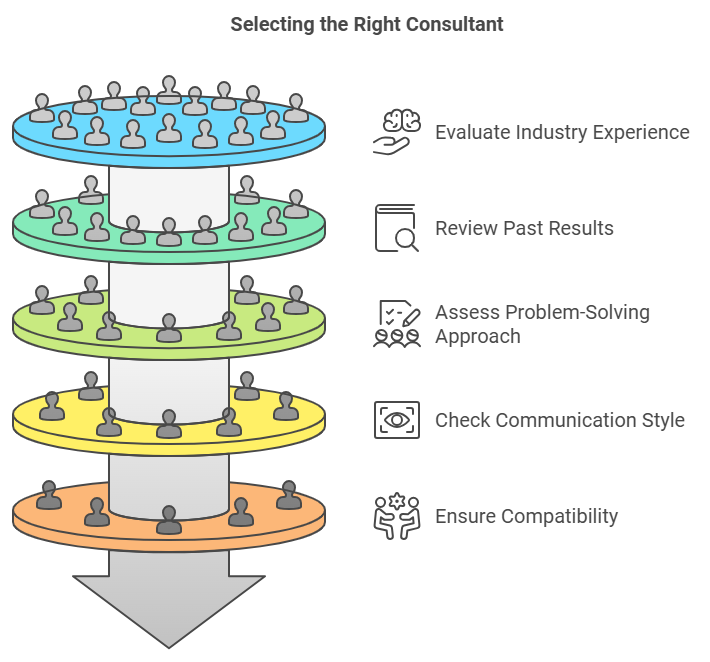 Navigating business management complexities can be daunting for small business owners. This makes consulting for small businesses a crucial resource. Whether dealing with strategic decisions, operational efficiencies, or market expansion, a consultant provides the necessary expertise and direction. This guide shows how consulting can transform various business aspects, from financial performance to customer engagement. By exploring different consulting services and using real-world examples, you’ll see how professional advice can significantly impact your small enterprise.
Navigating business management complexities can be daunting for small business owners. This makes consulting for small businesses a crucial resource. Whether dealing with strategic decisions, operational efficiencies, or market expansion, a consultant provides the necessary expertise and direction. This guide shows how consulting can transform various business aspects, from financial performance to customer engagement. By exploring different consulting services and using real-world examples, you’ll see how professional advice can significantly impact your small enterprise.
Understanding the Role of a Business Consultant
Understanding the role of a business consultant is crucial if you’re looking into consulting for small businesses. A business consultant acts as an advisor, using expertise and experience to help you improve your company’s performance. They analyze your business challenges and create strategies to solve them, boosting your company’s overall efficiency and profitability.
Business consultants specialize in various areas, including management consulting, marketing consulting, and financial advising. Management consultants focus on improving your organizational structure and business processes. They can help you streamline operations and increase productivity. Marketing consultants, on the other hand, will develop strategies to enhance your brand presence, increase customer engagement, and boost sales. Financial advisors are vital for ensuring that your financial practices support your business goals. They can offer advice on budgeting, investments, and other financial matters.
For small businesses, these consultants can be especially valuable. They provide tailored advice that addresses the unique challenges faced by smaller enterprises, often bringing in industry-specific knowledge that can propel your business forward. Working with a consultant can help you navigate complex business landscapes, make informed decisions, and set achievable long-term goals. The key is to choose a consultant whose expertise aligns with your specific needs and who can adjust their strategies to your business context. By doing so, you ensure that the consultant’s contributions lead to tangible improvements and help drive your business’s success.
Identifying When to Hire a Consultant
Identifying when to hire a consultant can be crucial for the success of your small business. One clear sign that consulting for small businesses might be necessary is when you’re planning to scale your operations. If you’re unsure how to manage growth effectively, a consultant can provide you with the strategies and tools you need to expand sustainably.
Another indicator is operational inefficiencies. If you notice that certain processes are taking longer than they should, or if there’s a decline in productivity, it might be time to bring in a consultant. They can analyze your workflows, identify bottlenecks, and recommend improvements to enhance efficiency.
Financial challenges are also a common reason to seek consulting services. If you’re experiencing cash flow issues, difficulty with financial planning, or if you need advice on securing funding, a financial consultant can help you address these issues. They can offer expertise in budget management, financial forecasting, and investment strategies that are tailored to your business needs.
Moreover, if you find yourself needing specialized knowledge that is outside your expertise, consulting services can fill that gap. Whether it’s navigating new market regulations, deploying new technology, or marketing your products effectively, consultants bring specialized knowledge that can help you make informed decisions.
Lastly, if your business is facing significant challenges that threaten its viability, such as a downturn in the market or increased competition, a consultant can help you devise a robust turnaround strategy. By addressing these signs proactively with the help of a consultant, you can position your business for long-term success.
Selecting the Right Consultant
Selecting the right consultant is a pivotal step in enhancing the effectiveness of consulting for small businesses. It’s crucial to choose a consultant whose expertise aligns with your specific needs and goals. Here are some tips to help you make the right choice:
First, consider the consultant’s industry experience. Look for a consultant who has a proven track record in your industry. Their familiarity with your market will enable them to understand your challenges and opportunities better and provide more tailored advice.
Next, evaluate their past results. Ask for case studies or references from past clients, particularly those in situations similar to yours. This will give you insight into their ability to deliver tangible outcomes and solve problems effectively.
Also, consider the consultant’s approach to problem-solving. It’s important that their methods resonate with your business’s culture and strategy. During your initial meetings, discuss their approach to handling challenges and see if it aligns with your expectations.
Furthermore, assess their communication style. You need a consultant who communicates clearly and effectively, keeping you informed throughout the process. Effective communication will be crucial in ensuring that you and the consultant understand each other’s expectations and goals.
Lastly, ensure compatibility. You will be working closely with your consultant, so it’s important that their business values align with yours. A consultant who shares your core values and vision for your business can greatly enhance the working relationship.
By carefully considering these factors, you can select a consultant who will not only understand the unique aspects of your business but also help drive your business towards success.
Costs and Benefits of Consulting Services
When considering consulting for small businesses, it’s important to analyze both the potential costs and benefits to make informed financial decisions. Consulting services can vary widely in cost, depending on the consultant’s expertise, the scope of the project, and the duration of the engagement. Costs might include hourly rates, project fees, or retainer agreements. While initially these costs may seem high, the benefits often outweigh them when properly leveraged.
The primary benefit of hiring a consultant is gaining access to specialized knowledge and skills that can help overcome challenges and improve business outcomes. Consultants can provide insights into industry best practices, offer objective advice, and help develop strategies for growth and efficiency. This expertise can lead to increased revenue, cost savings from improved processes, and a stronger competitive position in the market.
Moreover, consultants can help you focus on core business activities by handling complex projects that might otherwise consume a significant amount of your time and resources. This can lead to faster implementation of new initiatives and quicker adjustments to market changes, which are crucial for maintaining and gaining market share.
For small business owners, investing in consulting services can also be a way to stimulate innovation within the company. Consultants often bring new perspectives that can lead to fresh ideas for products, services, or business models. Additionally, the use of consultants can demonstrate to stakeholders, including investors and partners, that you are committed to company growth and continuous improvement.
In conclusion, while the costs associated with consulting can be considerable, the return on investment can be substantial if the consulting services are aligned with your business needs and goals. Careful selection of consultants and clear definition of project scope and expected outcomes are essential to maximizing the benefits of consulting for your small business.
Case Studies of Successful Consulting
Consulting for small businesses can have a transformative impact, as demonstrated by several real-life case studies. For example, consider the case of a small retail business that was struggling to manage its inventory and customer engagement effectively. By engaging a consulting firm specializing in retail management and digital marketing, the business was able to implement a new inventory system and enhance its online presence. This led to a 25% increase in sales within six months and significantly improved customer satisfaction scores.
Another success story involves a small manufacturing company facing operational inefficiencies and high production costs. A consulting service provided expertise in lean manufacturing techniques, helping the company streamline its production processes. As a result, the company reduced its operational costs by 15% and shortened the production cycle, making it more competitive in the market.
A third example is a small tech startup that needed help with its strategic direction and funding strategy. The consulting firm assisted in refining the business model and prepared the management team for pitching to investors. This guidance was crucial in securing a substantial investment, which allowed the company to scale operations and expand its customer base.
These cases illustrate how targeted consulting can address specific challenges that small businesses face, leading to significant improvements in their operations, financial health, and market position. Such success stories inspire confidence in the potential of consulting services to catalyze growth and efficiency in small businesses. These examples also underscore the importance of choosing the right consultant with the relevant expertise to meet your specific needs.
Maximizing the Value of Consulting
Maximizing the value of consulting for small businesses involves careful planning and active engagement in the consulting process. Here are some strategies to ensure that you get the most out of your consulting experience.
First, clearly define your goals and challenges before you engage a consultant. Understand what you hope to achieve and identify the specific areas where you need help. This preparation will help you communicate your needs effectively and enable the consultant to tailor their services to your business.
When working with a consultant, open and continuous communication is key. Ensure that you are regularly discussing progress, any issues that arise, and adjustments to plans as needed. This helps maintain alignment between your objectives and the consultant’s approach, ensuring that the consultant’s work is relevant and focused.
Implementing the consultant’s recommendations successfully is crucial. Start by creating a detailed action plan that outlines steps, timelines, and responsibilities. This plan should be realistic and align with your business’s resources and capabilities. Engage your team in this process so they understand the changes and the reasons behind them.
To further enhance the value of consulting, seek to learn from the consultant during your engagement. Ask questions about best practices and request insights into how you can avoid common pitfalls. This learning can build internal capabilities and reduce future reliance on external consultants.
Lastly, after the consulting project concludes, evaluate the outcomes against your initial goals. This evaluation will help you understand the effectiveness of the consulting services and guide future decisions regarding consulting needs.
By following these strategies, you can maximize the benefits of consulting for small businesses, making the most of the expertise consultants bring to the table.
Conclusion
Consulting for small businesses provides a strategic advantage through expert advice tailored to specific challenges and growth opportunities. Whether enhancing operational efficiency, refining marketing strategies, or streamlining financial practices, the right consultant can make a significant difference. It’s crucial to select a consultant whose expertise matches your business needs and who can offer practical, actionable solutions. The success of a consulting engagement depends not only on the consultant’s expertise but also on your readiness to implement changes and your commitment to continuous improvement. By actively participating in the consulting process and applying the recommendations provided, you can achieve substantial improvements in business performance and establish a strong foundation for future success. This proactive approach ensures that consulting for small businesses is an investment in your company’s future, not just an expenditure.


